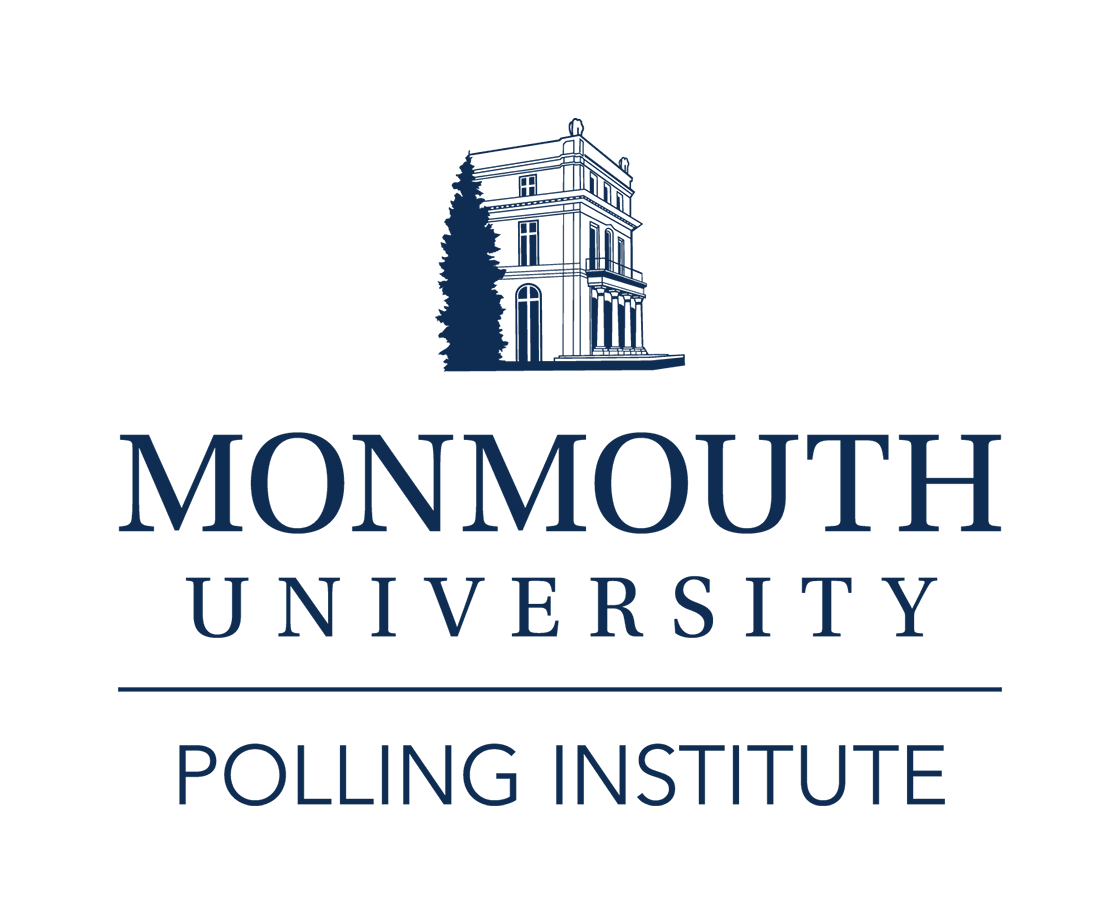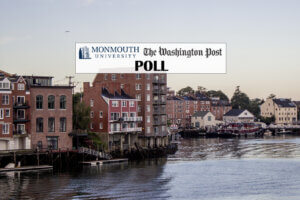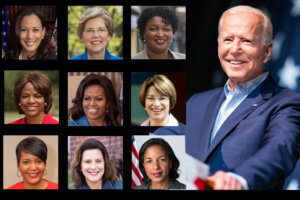West Long Branch, NJ – In the last few days before New Hampshire votes, Donald Trump and Bernie Sanders lead the packs in their parties’ respective primaries. The latest Monmouth University Poll of likely Granite State primary voters finds a crowded field in the race for second place in the GOP contest and a narrowing of the gap in the Democratic race. Most of the interviews for this poll were conducted between Thursday’s Democratic debate and Saturday’s Republican debate.
— Republican primary —
Donald Trump earns 30% support from voters likely to participate in Tuesday’s Republican primary. He currently leads all other candidates by double digits, while four candidates vie for second place – John Kasich (14%), Marco Rubio (13%), Jeb Bush (13%), and Ted Cruz (12%). Other candidates receive single digit support, including Chris Christie (6%), Carly Fiorina (5%), and Ben Carson (4%). For most of these candidates, support levels are basically unchanged from Monmouth’s New Hampshire poll last month. The one exception is Bush, who has gained 9 points since January. Again, it is important to remember that the vast majority of interviews for this poll were conducted before last night’s GOP debate.
Barely half (49%) of likely Republican primary voters say that they are completely decided on their candidate choice just days before Tuesday’s election. Another 31% have a strong preference but are still open to considering other candidates. One-fifth either have only a slight preference (12%) or are really undecided (9%).
To put this in context, New Hampshire Republicans express a similar level of commitment as Iowa Republicans did in the poll Monmouth took shortly before that state’s caucuses last week. A follow-up survey of those voters found that nearly all of the “completely decided” voters in that contest actually stuck with their original vote choice. However, among those with a “strong preference,” just over half stuck with their original vote intention, 1-in-4 switched to another candidate, and about 1-in-5 decided not to vote at all. Among those with weaker levels of support going into the final days of the Iowa race, about one-third stuck with their original candidate, one-third switched horses, and one-third stayed home.
“Volatility is the name of the game in 2016’s first primary contest, just as it was in the first caucus state last week. While Trump’s placement as the top finisher seems fairly secure at this point, the margin of victory and final order of the remaining candidates are still very much up for grabs,” said Patrick Murray, director of the independent Monmouth University Polling Institute.
The poll asked Republican voters about their potential to support different candidates from the one they are already backing. In addition to the 30% who currently support Trump, another 15% say they would be at least somewhat likely to end up voting for him on Tuesday while 49% say they would be not at all likely. For Kasich, his current 14% support could be augmented by 18% potential support compared to 57% who would definitely not support him. For Rubio it’s 13% current support and 26% potential support versus 49% who would not vote for him. Of course, it is important to remember that this was prior to Rubio’s performance in last night’s debate. For Bush it’s 13% current support and 16% potential support versus 61% who would not vote for him. For Cruz – 12% current support and 17% potential support versus 59% who would not vote for him. For Christie – 6% current support and 18% potential support versus 62% who would not vote for him.
In making their final decision about who to support on Tuesday, more GOP primary voters put greater weight on someone who shares their values (55%) than voting for someone who can win the White House in November (30%). Another 13% feel there is no need to prioritize these two concerns. Trump actually does slightly better with electability voters (33%) than shared values voters (25%), but he still leads the field among both groups. Rubio has greater support among voters focused on electability (22%) rather than shared values (9%). Kasich does better with shared values (17%) than electability (9%) voters.
— Democratic primary —
Bernie Sanders currently holds a 52% to 42% lead over Hillary Clinton in New Hampshire’s Democratic primary. This is a slightly tighter contest than the 53% to 39% lead Sanders held in Monmouth’s January poll. Now that it is effectively a two person race – despite the fact that 28 names appear on Tuesday’s ballot – since Martin O’Malley dropped out of the race, the number of likely voters who do not lean toward any candidate has gone up to 6% from 2% last month.
Fully 6-in-10 (60%) likely Democratic primary voters say that they are completely decided on their candidate choice. Clinton (68%) supporters are slightly more likely than Sanders backers (60%) to say their vote is locked in. These results indicate a slight solidification over the 52% who were completely decided last month. Another 23% of Democrats have a strong preference but are still open to considering other candidates. Fewer than 1-in-5 either have only a slight preference (7%) or are really undecided (10%).
“Sanders is sitting in the driver’s seat heading into the last few days before New Hampshire voters head to the polls,” said Murray.
Sanders supporters and undecided voters were asked about the possibility of them actually voting for Clinton on Tuesday. In addition to the 42% support she already receives, another 13% of voters say they are at least somewhat likely to mark their ballots for Clinton when they go to the polls, while 35% say they are not at all likely to do so. Among Clinton supporters and undecided voters, Sanders could potentially add 15% to his current 52% support, while just 25% say they definitely would not consider voting for him on Tuesday.
In making their final decision about who to support, Democratic voters are significantly more likely to prioritize shared values (63%) than the ability to win the White House (23%). Another 13% feel there is no need to choose between these two concerns. Sanders voters are much more likely to place a premium on shared values (82%) over electability (10%), while Clinton supporters are more divided between shared values (43%) and electability (37%).
About half of both Democratic (54%) and Republican (49%) primary voters say they have been personally contacted to obtain their support for a candidate, indicating the high level of retail politicking that goes on in New Hampshire and the potential for last minute appeals to sway voters.
Murray added, “These results reflect the state of the New Hampshire primary races as of Saturday night. If you want a prediction, I can only suggest you turn on the TV at 8 pm eastern time Tuesday night.”
The Monmouth University Poll was conducted by telephone from February 4 to 6, 2016 with 508 New Hampshire voters likely to vote in the Republican presidential primary and 502 New Hampshire voters likely to vote in the Democratic presidential primary. The Republican likely primary voter sample has a margin of error of ± 4.4 percent and the Democratic likely primary voter sample has a margin of error of ± 4.4 percent. The poll was conducted by the Monmouth University Polling Institute in West Long Branch, NJ.
DATA TABLES
The questions referred to in this release are as follows:
(* Some columns may not add to 100% due to rounding.)
ASKED OF LIKELY REPUBLICAN PRIMARY VOTERS:
R1. If the Republican primary election for president was today, would you vote for – [NAMES WERE ROTATED]
| Feb. 2016 | Jan. 2016 | Nov. 2015 | Sept. 2015 | July 2015 | |
| Donald Trump | 30% | 32% | 26% | 28% | 24% |
| John Kasich | 14% | 14% | 11% | 11% | 7% |
| Marco Rubio | 13% | 12% | 13% | 4% | 6% |
| Jeb Bush | 13% | 4% | 7% | 7% | 12% |
| Ted Cruz | 12% | 14% | 9% | 8% | 3% |
| Chris Christie | 6% | 8% | 5% | 2% | 4% |
| Carly Fiorina | 5% | 5% | 5% | 7% | 3% |
| Ben Carson | 4% | 3% | 16% | 17% | 5% |
| (VOL) Other | 1% | 0% | 0% | 3% | 8% |
| Jim Gilmore |
n/a | 0% |
<1% | 0% |
<1% |
| Lindsey Graham |
n/a |
n/a |
<1% | 1% | <1% |
| Mike Huckabee |
n/a | 1% | 1% | 1% | 2% |
| Bobby Jindal |
n/a |
n/a | 0% |
<1% | 2% |
| George Pataki |
n/a |
n/a |
<1% | 1% | 2% |
| Rand Paul |
n/a | 4% | 3% | 4% | 5% |
| Rick Santorum |
n/a | 0% |
<1% | 1% | 1% |
| (VOL) Undecided |
3% | 3% | 4% | 7% | 14% |
| (n) | (508) | (414) | (410) | (415) | (467) |
R2. Which of the following best describes where your decision stands at this moment: I am completely decided on which candidate I will support, I have a strong preference right now but I am willing to consider other candidates, I have a slight preference among a group of candidates I like, or I am really undecided among a number of candidates?
| Feb. 2016 | Jan. 2016 | Nov. 2015 | |
| Completely decided | 49% | 32% | 20% |
| Strong preference | 31% | 42% | 39% |
| Slight preference | 12% | 15% | 22% |
| Undecided | 9% | 12% | 19% |
R3. How likely is it that you could end up voting for [CANDIDATE NAME] on Tuesday – very, somewhat, not too, or not at all likely? [NAMES WERE ROTATED]
| Already support (R1) | Very likely | Somewhat likely | Not too likely | Not at all likely | (VOL) Don’t know | |
| Jeb Bush | 13% | 1% | 15% | 9% | 61% | 1% |
| Chris Christie | 6% | 2% | 16% | 14% | 62% | 1% |
| Ted Cruz | 12% | 1% | 16% | 10% | 59% | 1% |
| John Kasich | 14% | 1% | 17% | 10% | 57% | 2% |
| Marco Rubio | 13% | 3% | 23% | 12% | 49% | 1% |
| Donald Trump | 30% | 1% | 14% | 6% | 49% | 1% |
R4. In deciding who to support for the Republican nomination for president, is it more important to you: that the candidate shares your values or that the candidate can win the White House in November? [CHOICES WERE ROTATED]
| Feb. 2016 | |
| Shares your values | 55% |
| Can win the White House | 30% |
| (VOL) Both | 13% |
| (VOL) Don’t know | 2% |
R5. Did anyone contact you personally to ask you to vote for a particular candidate?
| Feb. 2016 | |
| Yes | 49% |
| No | 51% |
**********************************************************
ASKED OF LIKELY DEMOCRATIC PRIMARY VOTERS:
D1. If the Democratic primary election for president was today, would you vote for – [NAMES WERE ROTATED]?
| Feb. 2016 | Jan. 2016 | Nov. 2015 |
Sept. |
Sept. | |
| Bernie Sanders | 52% | 53% | 45% | 49% | 43% |
| Hillary Clinton | 42% | 39% | 48% | 41% | 36% |
| (VOL) Other | 1% | 0% | 0% | 2% | 1% |
| Martin O’Malley |
n/a | 5% | 3% | 3% | 2% |
| Larry Lessig |
n/a |
n/a | 1% | 1% | 1% |
| Joe Biden |
n/a |
n/a |
n/a |
n/a | 13% |
| Lincoln Chafee |
n/a |
n/a |
n/a |
n/a | 1% |
| Jim Webb |
n/a |
n/a |
n/a |
n/a | 1% |
| (VOL) Undecided | 6% | 2% | 3% | 5% | 3% |
| (n) | (502) | (413) | (403) | (400) | (400) |
*Biden, Chafee, Webb voters reassigned to their second choice.
D2. Which of the following best describes where your decision stands at this moment: I am completely decided on which candidate I will support, I have a strong preference right now but I am willing to consider other candidates, I have a slight preference among a group of candidates I like, or I am really undecided among a number of candidates?
| Feb. 2016 | Jan. 2016 | Nov. 2015 | |
| Completely decided | 60% | 52% | 35% |
| Strong preference | 23% | 32% | 38% |
| Slight preference | 7% | 8% | 14% |
| Undecided | 10% | 8% | 13% |
D3. How likely is it that you could end up voting for [CANDIDATE NAME] on Tuesday – very, somewhat, not too, or not at all likely? [NAMES WERE ROTATED]
|
Already |
Very |
Somewhat |
Not too |
Not at |
(VOL) | |
| Hillary Clinton | 42% | 2% | 11% | 8% | 35% | 2% |
| Bernie Sanders | 52% | 2% | 13% | 6% | 25% | 2% |
D4. In deciding who to support for the Democratic nomination for president, is it more important to you: that the candidate shares your values or that the candidate can win the White House in November? [CHOICES WERE ROTATED]
| Feb. 2016 | |
| Shares your values | 63% |
| Can win the White House | 23% |
| (VOL) Both | 13% |
| (VOL) Don’t know | 1% |
D5. Did anyone contact you personally to ask you to vote for a particular candidate?
| Feb. 2016 | |
| Yes | 54% |
| No | 46% |
The Monmouth University Poll was sponsored and conducted by the Monmouth University Polling Institute from February 4 to 6, 2016 with a statewide random sample of New Hampshire voters drawn from a list of registered voters, who participated in a primary election in the past two election cycles or voted in both the 2012 and 2014 general elections, and indicate they will vote in the presidential primary on February 9, 2016. This was supplemented by a sample of new voters who say they are likely to register and vote in the primary. Monmouth is responsible for all aspects of the survey design, data weighting and analysis. Final sample is weighted for age and gender based on state registration list information on the pool of voters who participate in primary elections. Data collection support provided by Braun Research (field) and Aristotle (voter list and non-voter sample). The total sample of 1,010 likely voters includes 707 contacted by a live interviewer on a landline telephone and 203 contacted by a live interviewer on a cell phone, in English.
For results based on the sample of 508 likely Republican primary voters, one can say with 95% confidence that the error attributable to sampling has a maximum margin of plus or minus 4.4 percentage points (unadjusted for sample design). For results based on the sample of 502 likely Democratic primary voters, one can say with 95% confidence that the error attributable to sampling has a maximum margin of plus or minus 4.4 percentage points (unadjusted for sample design). Sampling error can be larger for sub-groups (see table below). In addition to sampling error, one should bear in mind that question wording and practical difficulties in conducting surveys can introduce error or bias into the findings of opinion polls.
|
POLL DEMOGRAPHICS (weighted) | ||
|
LIKELY REPUBLICAN PRIMARY VOTERS | ||
| 61% Reg Rep | 55% Male | 11% 18-34 |
| 29% Reg Indep | 45% Female | 27% 35-49 |
| 10% New voter | 35% 50-64 | |
| 27% 65+ | ||
|
POLL DEMOGRAPHICS (weighted) | ||
|
LIKELY DEMOCRATIC PRIMARY VOTERS | ||
| 59% Reg Dem | 42% Male | 13% 18-34 |
| 28% Reg Indep | 58% Female | 24% 35-49 |
| 14% New voter | 38% 50-64 | |
| 25% 65+ | ||
Click on pdf file link below for full methodology and results by key demographic groups.




